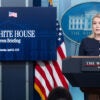If economic sages were judged the same way major league baseball hitters are, Alan Greenspan hitting .333 would deserve the attention he garners. In recent months the former Federal Reserve Board Chairman struck out badly twice on what in economic terms could be considered batting-practice fastballs. But in today’s at-bat, a persuasive column in the Financial Times, the old Maestro finally connected.
As Greenspan observes, “Fear Undermines America’s Economy.” Fear of inflation. Fear of deflation. Fear of higher taxes. Fear of generalized governmental foolishness.
The Daily Signal depends on the support of readers like you. Donate now
Uncertainty, of course, is inherent to the economy: Uncertainty about a new product offering, uncertainty about market shifts and trends. What drives an economy forward or holds it back is how businesses view uncertainty and how they react to it. As Greenspan notes, American businesses today react in fear and their reaction is to stand pat.
In economic terms, the opposite of fear is confidence. There is opportunity in uncertainty, profit in uncertainty. Uncertainty need not be a bad thing. The uncertainty may be between good and better. When businesses are confident, they see uncertainty and they see possibilities. They plan and build for the future. They hire for the future. They push research and development for the future because they are confident that in the future the market will reward them. Confidence is the true liquidity of the marketplace.
As Greenspan observes, fear reigns today. What he doesn’t mention is that businesses have reason to fear, which brings us to Greenspan’s two previous dismal policy at-bats in recent memory. In an interview for Bloomberg back in July, Greenspan said Congress should let taxes on families, businesses, and investors jump on January 1 by letting the 2001/2003 tax cuts expire. To review the bidding: The economy is floundering so much the Federal Reserve is anticipating a return to aggressive stimulus despite the heightened threat to new asset price bubbles and eventually to higher inflation. Facing such a weak economy, Greenspan thinks we should raise taxes. Most Americans instinctively know that’s foolish. Strike three, Mr. Greenspan; find some pine.
Another great source of fear is current and projected federal budget deficits and what they mean for credit market conditions, the U.S. credit rating, and taxes. The U.S. is on a collision course with a painful fiscal reality. This was true before Obama became President, but Obama’s spending surge and fiscal non-stimulus put the pedal to the metal.
And Greenspan’s take? Greenspan advocated for the fiscal stimulus to boost the economy. Somehow the idea that taking money out of the economy by increased federal borrowing to put money back into the economy led Greenspan and many others to believe this little fiscal alchemy meant the economy would strengthen. Late in 2009, Greenspan backtracked a bit when he said we did not need so much fiscal stimulus because the wealth effect of global stock market recovery was more powerful. He was worried the economy would pick up steam too quickly. Right.
In mid-2010, as the evidence built up that neither the stimulus nor the wealth effect was working, Greenspan admitted that “it’s very hard to know what stimulus does.” And in September he admitted that the stimulus was much less effective than he expected because “very large deficits concurrently crowd out capital investment.” Not to put too fine a point on it, but, well, duh.
When government spends more by borrowing more, the private sector spends less by borrowing less. A sage should have known this. He does now, apparently.
Fear. Fear of government policies that raise taxes on a weak economy. Fear of budget deficits and credit market crises. Fear of a regulatory onslaught from the Obama Administration. And one more thing: fear that Greenspan will continue to take his policy swings and we’ll see his batting average fall steadily.































